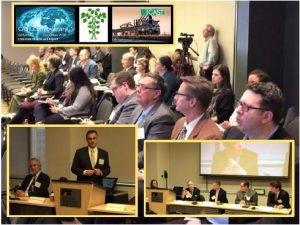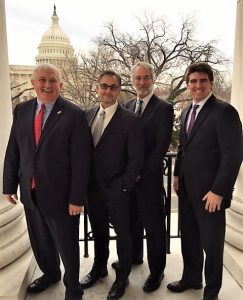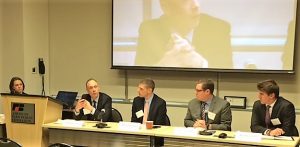Watch the webinar “HPAI and Its Impact on Food Production Industries”
 “Here’s how we’re all losing; how can we all win?”
“Here’s how we’re all losing; how can we all win?”The Council for Agricultural Science and Technology rolled out its latest paper–The Impact of Asynchronous Approvals for Biotech Crops on Agricultural Sustainability, Trade, and Innovation–on December 8, with a presentation for Senate staffers and a Lunch ‘N Learn for House staffers. The literature review and report was also presented at an afternoon session cohosted by the U.S. Biotech Crops Alliance at the American Farm Bureau Federation Building. Experts from government, academia, and agribusiness seemed to agree with the statement above from one of the panel members. He pointed out that all countries, all producers, and all consumers lose under the current fractured system of asynchronous approvals. CAST’s literature review and report looks at ways to solve the problems.
Click here to view the presentation of the paper by Dr. Kalaitzandonakes followed by the panel discussion. (CAST intro: 0:00 – 09:25; Presentation of Report: 09:26 – 39:49; Panel: 39:50 – 1:26:03)
News Release: December 8, 2016…Council for Agricultural Science and Technology, Ames, Iowa.
The Impact of Asynchronous Approvals for Biotech Crops on Agricultural Sustainability, Trade, and Innovation
This CAST literature review and report looks at problems caused by the current system of asynchronous approvals for biotech crops. The authors focus on the economic effects in countries that are major global commodity exporters and importers, which show that asynchrony in the global approval of new biotech crops and the resultant risk of low level presence (LLP) puts large volumes of trade worth billions of dollars at risk. In particular, the increasing disparity in the biotech product approval timelines between exporting countries that utilize new technologies and large grain importing countries is a significant and growing impediment to trade, specifically in the European Union and China. As Task Force Chair Dr. Nicholas Kalaitzandonakes said, “How the world’s regulatory systems operate in the area of biotech crops is critically important to producers and consumers.” The paper shares research regarding the impacts on the following:
The report offers several potential solutions and provides research about approaches that might ease the negative impacts of asynchronous approvals and LLP. “More research is needed to evaluate the global cost of asynchronous approvals and LLP, the impacts of asynchrony on innovation and crop improvements, and the decision-making process of biotech developers, in both the public and private sectors,” say the authors. “Timely research could inform policymaking and improve the design of policy instruments.”
Many factors influence the approval process–including differences in institutional arrangements, regulatory procedures, administrative capacity, and attitudes toward biotech crops. Therefore, the time required to review new biotech events varies significantly from one country to another. But, as this paper concludes, “As long as the current situation persists, agricultural biotechnology will be prevented from delivering the full range of promised benefits of improved standard of living and food security.”
Task Force Authors:
Nicholas Kalaitzandonakes (Chair), University of Missouri-Columbia
Val Giddings, Information Technology and Innovation Foundation
Alan McHughen, University of California-Riverside
Ken Zahringer, University of Missouri-Columbia
This CAST Literature Review and Report (QTA2016-2), its companion Ag quickCAST, and a Chinese version of the paper are available online at the CAST website, www.cast-science.org, along with many of CAST’s other scientific publications. All CAST Issue Papers, Commentaries, and Ag quickCASTs are FREE. This study was funded by the U.S. Department of Agriculture’s Foreign Agricultural Service.
Contacts for this CAST Report:
Nicholas Kalaitzandonakes–Phone: 573-882-0143; E-mail: KalaitzandonakesN@missouri.edu
Kent Schescke–Phone: 515-292-2125, ext. 231; E-mail: kschescke@cast-science.org
Photo above right (left to right): Kent Schescke (CAST Executive Vice President); Dr. Kalaitzandonakes (Univ. of Missouri-Columbia; Task Force Chair and author for the publication), Val Giddings (Information Technology and Innovation Foundation; one of the authors for the publication), and Andrew Conner (Manager of Global Biotechnology, U.S. Grains Council).
 Photo at left of the panel presentation at the session hosted by CAST and The U.S. Biotech Crops Alliance : (left to right) Veronica Nigh (Economist, American Farm Bureau Federation), Jonathan Cordone (USDA Deputy Under Secretary, Farm and Foreign Agricultural Services), Bobby Frederick (Director of Legislative Affairs and Public Policy, National Grain and Feed Association), Matthew O’Mara (Managing Director, International Affairs, The Biotechnology Innovation Organization), and Andrew Conner (Manager of Global Biotechnology, U.S. Grains Council).
Photo at left of the panel presentation at the session hosted by CAST and The U.S. Biotech Crops Alliance : (left to right) Veronica Nigh (Economist, American Farm Bureau Federation), Jonathan Cordone (USDA Deputy Under Secretary, Farm and Foreign Agricultural Services), Bobby Frederick (Director of Legislative Affairs and Public Policy, National Grain and Feed Association), Matthew O’Mara (Managing Director, International Affairs, The Biotechnology Innovation Organization), and Andrew Conner (Manager of Global Biotechnology, U.S. Grains Council).
Your donation to CAST helps support the CAST mission of communicating science to meet the challenge of producing enough food, fiber and fuel for a growing population. Every gift, no matter the size, is appreciated.